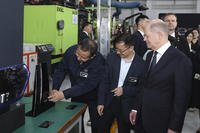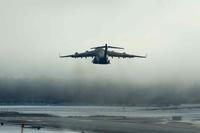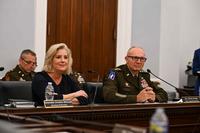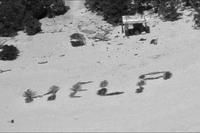The U.S. military has no current plans to intervene against the Syrian regime and Russian assault on Aleppo or provide air drops to the starving civilians, a U.S. military spokesman in Baghdad said Wednesday.
"The situation in and around Aleppo has, in our view, become dire" but "our focus really is to defeat ISIL, so that's where our focus remains," Army Col. Steve Warren, a spokesman for Combined Joint Task Force-Operation Inherent Resolve, referring to the Islamic State in Iraq and Syria, or ISIS, also known as ISIL.
Warren echoed the policy of the White House, the State Department and the Pentagon that has rejected to date the pleas of human rights groups for the creation of a safe zone or a no-fly zone along the Turkish border to protect thousands of refugees fleeing Aleppo in northeastern Syria.
The U.S. has also rejected calls to protect a safe route for aid columns to reach Aleppo. "The United Nations and other humanitarian organizations really have the lead for moving humanitarian relief," Warren said.
In a report Monday, the UN condemned the "inhuman actions" of the Syrian regime in attacking Aleppo -- an operation that it said "amounts to extermination."
While condemning the indiscriminate bombing by the Russians that has cleared the way for the ground forces of Syrian President Bashar al-Assad, Warren said that ISIS fighters were not present in or around Aleppo.
"This military coalition is focused on defeating Daesh," another acronym for ISIS. "It's other elements of government that are focused on providing humanitarian support," Warren said in a video briefing from Baghdad to the Pentagon.
Aleppo was a city of about 3 million residents before Syria's civil war which has killed more than 250,000 by UN estimates and sent millions of refugees fleeing to neighboring countries and to Europe. Warren said there might be as many as 1 million civilians left in Aleppo, where positions had been static for years with rebels holding about half of the city and the regime holding the other half.
Warren charged that Russian airstrikes had destroyed two hospitals in Aleppo, depriving medical care to about 50,000 people. Separately, the aid group Medicins Sans Frontieres, MSF, also known as Doctors Without Borders, said that an airstrike had hit a hospital supported by the group in the southern town of Deraa, killing three and injuring six.
The airstrikes against Aleppo put the lie to Moscow's claims that its Syrian air campaign begun last September was primarily intended to defeat ISIS, Warren said. "They claimed they were interested in fighting ISIL but we haven't seen that. They've done nothing but prop up Bashar al-Assad, which we know is the root of the problem" in Syria, Warren said.
In Aleppo and in the Azaz district north of the city, the local medical system was collapsing, MSF said in a statement. Several hospitals and smaller health facilities in Azaz and rural areas around Aleppo city were hit by airstrikes in the last two weeks, including at least three MSF-supported hospitals. Many medical staff have fled, MSF said.
"Azaz District has seen some of the heaviest tolls of this brutal war, and yet again we are seeing health care under siege," said Muskilda Zancada, MSF head of mission in Syria.
"We are extremely concerned about the situation in the south of the district, where medical staff, fearing for their lives, have been forced to flee, and hospitals have either completely closed, or only offer limited emergency services," Zancada said.
The UN's World Food Program (WFP) announced Wednesday that it has started distributing food to the thousands of refugees backed up at the Turkish border. Food aid also was convoyed into Azaz, the WFP said.
"The situation is quite volatile and fluid in northern Aleppo with families on the move seeking safety," said Jakob Kern, WFP's Country Director in Syria.
"We are extremely concerned as access and supply routes from the north to eastern Aleppo city and surrounding areas are now cut off but we are making every effort to get enough food in place for all those in need, bringing it in through the remaining open border crossing point from Turkey," he said.
-- Richard Sisk can be reached at Richard.Sisk@Military.com.



























